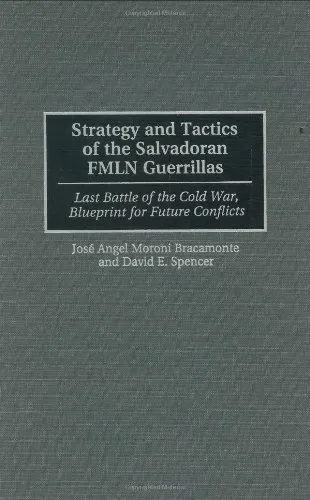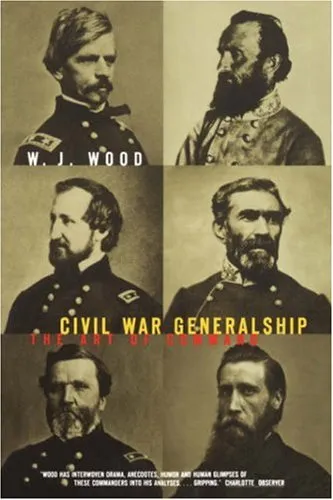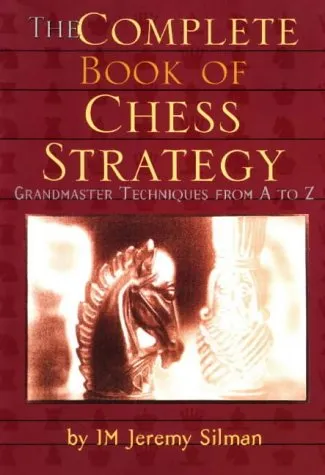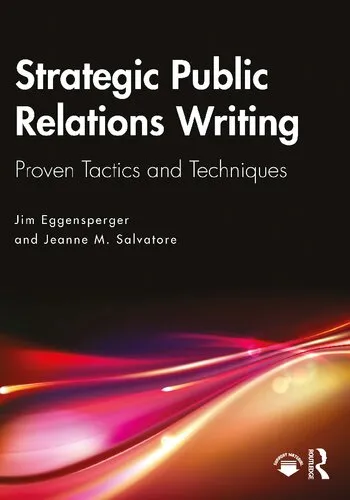Strategy and Tactics of the Salvadoran FMLN Guerrillas: Last Battle of the Cold War, Blueprint for Future Conflicts
4.5
بر اساس نظر کاربران

شما میتونید سوالاتتون در باره کتاب رو از هوش مصنوعیش بعد از ورود بپرسید
هر دانلود یا پرسش از هوش مصنوعی 2 امتیاز لازم دارد، برای بدست آوردن امتیاز رایگان، به صفحه ی راهنمای امتیازات سر بزنید و یک سری کار ارزشمند انجام بدینکتاب های مرتبط:
معرفی کتاب "Strategy and Tactics of the Salvadoran FMLN Guerrillas: Last Battle of the Cold War, Blueprint for Future Conflicts"
کتاب Strategy and Tactics of the Salvadoran FMLN Guerrillas اثری بینظیر و تحلیلی است که عمیقاً به استراتژیها و تاکتیکهای نظامی و سیاسی جبهه آزادیبخش ملی فارابوندو مارتی (FMLN) در السالوادور میپردازد. این کتاب نه تنها تصویری روشن از آخرین نبردهای جنگ سرد ارائه میکند، بلکه بهعنوان الگویی برای شورشها و درگیریهای آینده نیز شناخته میشود.
خلاصهای از کتاب
این اثر، که توسط "Jose Angel Moroni Bracamonte" و "David E. Spencer" نوشته شده است، نگاهی جامع به چگونگی مبارزات FMLN در برابر دولت حامی ایالات متحده در السالوادور در طول دهه 1980 ارائه میدهد. نویسندگان با استفاده از منابع اولیه، اسناد تاریخی و تحلیلهای میدانی، روندهای کلیدی در استراتژیهای چریکی، جنگهای غیرمتقارن و سازماندهی اجتماعی جنبش را توضیح میدهند. کتاب الگوریتمی برای درک پیوند بین سیاست، ایدئولوژی و عملیات نظامی یک جنبش اجتماعی را تبیین میکند؛ جنبشی که هدف آن بهبود ساختار قدرت در جامعه بود.
مطالعه این اثر، چشماندازی بیسابقه از تجربه چریکیها، چگونگی سازماندهی نظامی، و اهمیت تاکتیکهای نوین در یک جهان چندقطبی ارائه میدهد.
نکات کلیدی آموزنده
- تحلیل جامع از استراتژیهای چریکی که در برابر نیروهای مرسوم و مجهز استفاده شدهاند.
- ارائه درک عمیق از مفاهیم جنگهای نامتقارن و راهبرد "insurgency and counterinsurgency".
- توضیح نقش ایدئولوژی مارکسیستی و چگونگی تاثیر آن بر سبک مبارزات FMLN.
- شناسایی اهمیت حمایت مردمی در موفقیت جنبشهای چریکی.
نقلقولهای معروف از کتاب
“Insurgency is not merely a military struggle but also a battle for the hearts and minds of the population.”
“The FMLN's strength lay not only in its military tactics but in its ability to adapt politically, socially, and ideologically.”
“The lessons of El Salvador remain relevant for understanding modern conflicts characterized by asymmetric warfare.”
چرا این کتاب اهمیت دارد؟
کتاب Strategy and Tactics of the Salvadoran FMLN Guerrillas از اهمیت ویژهای برخوردار است زیرا درکی جامع از یکی از پیچیدهترین و تأثیرگذارترین جنگهای چریکی در تاریخ معاصر ارائه میدهد. با برجسته کردن استراتژیها و تاکتیکهایی که توسط FMLN به کار رفت، این اثر به تحلیلگران نظامی، سیاستمداران و حتی فعالان اجتماعی کمک میکند تا جنگهای نامتقارن مدرن و شورشها در دیگر نقاط جهان را بهتر بفهمند.
این کتاب برای افرادی که به مطالعه درگیریهای سیاسی و نظامی، استراتژیهای ضد شورش (Counterinsurgency) و آینده جنگهای چریکی علاقه دارند، منبعی ضروری است. همچنین، این اثر نشان میدهد که چگونه یک جنبش کوچک و سازمانیافته میتواند در برابر نیروهای بزرگتر و مجهزتر مقاومت کند و موفق شود.
اگر به دنبال فهم عمیقتری از تاکتیکهای جنگهای نامتقارن و پیچیدگیهای ایدئولوژیهای چریکی هستید، این کتاب تمامی ابزارهای لازم را در اختیار شما قرار خواهد داد.
Introduction
Strategy and Tactics of the Salvadoran FMLN Guerrillas: Last Battle of the Cold War, Blueprint for Future Conflicts is a comprehensive and thought-provoking examination of one of the most significant insurgencies of the late 20th century. Written by Jose Angel Moroni Bracamonte and David E. Spencer, this book offers a deep dive into the strategies and tactics employed by the Farabundo Martí National Liberation Front (FMLN) during El Salvador’s civil war (1980–1992), providing insights not only into the guerrilla warfare they waged but also into the intricate interplay of geopolitics, ideology, and social transformation.
This book situates the Salvadoran insurgency in the broader context of the Cold War and explores how the experience of the FMLN can serve as a blueprint for understanding future asymmetric conflicts. Combining historical analysis, battlefield accounts, and theoretical discussion, this work is essential for military strategists, historians, students of political science, and anyone interested in understanding unconventional warfare. At its core, the book serves as a lens through which readers can view the dynamics of conflict in an ever-changing world.
As insurgencies and asymmetrical wars continue to dominate contemporary global conflicts, the lessons drawn from the FMLN’s approach provide invaluable insights for both policymakers and military practitioners. Through a meticulous analysis of their operational tactics, organizational strategies, and ideological resilience, Bracamonte and Spencer showcase how a determined and disciplined guerrilla movement can challenge even the most formidable state powers.
Detailed Summary
The book chronicles the rise of the FMLN from its inception as a coalition of five Marxist-Leninist revolutionary groups to its eventual transformation into a political party following the 1992 Chapultepec Peace Accords. It opens by framing El Salvador’s civil war within the larger Cold War struggle between the United States and the Soviet Union, highlighting how superpower rivalry influenced the course of the conflict. The authors analyze the FMLN's early setbacks and their evolution into a highly organized and disciplined force capable of challenging the Salvadoran military.
Central to the narrative is the detailed exploration of the FMLN’s military strategies, including their use of guerrilla warfare, urban operations, and political mobilization. The book delves into their adaptive tactics, use of terrain, and decentralized command structure, which allowed them to sustain a prolonged conflict against a U.S.-backed government. The authors also examine the FMLN’s robust propaganda efforts, which helped garner both domestic and international support. Through concrete examples, the book demonstrates how the FMLN’s integrated approach to military and political strategy enabled them to achieve significant gains, despite limited resources.
The latter part of the book shifts focus toward the peace negotiations and the transition of the FMLN into a legitimate political force. It evaluates how the movement balanced its ideological goals with the realities of the negotiating table, offering insights into the complexities of ending a protracted war. Additionally, the book reflects on the lessons learned from the Salvadoran experience and applies them to potential scenarios in future conflicts.
Key Takeaways
- The importance of adaptability in warfare: The FMLN’s ability to modify its strategies was critical to its survival and success.
- Integration of political and military objectives: The FMLN’s unified strategy was a cornerstone of its effectiveness.
- The role of ideology and propaganda in sustaining morale and garnering support: Effective communication was as vital as battlefield success.
- The impact of superpower involvement: The Cold War backdrop shaped much of the conflict’s trajectory.
- The shift from armed struggle to political participation: The transition from war to peace provides lessons in reconciliation and rebuilding.
Famous Quotes from the Book
“The guerrilla, like a fish, must swim in the sea of the people; without their support, the waters dry up, and survival becomes impossible.”
“Victory in asymmetrical warfare is not always defined by the annihilation of the enemy but by achieving legitimacy, strength, and balance at the negotiating table.”
“To fight a state supported by superpower resources, the guerrilla must replace quantity with quality, rigidity with fluidity, and firepower with resilience.”
Why This Book Matters
The enduring significance of Strategy and Tactics of the Salvadoran FMLN Guerrillas lies in its ability to bridge the historical and the contemporary. While the focus is on the Salvadoran experience, the broader themes resonate in today’s world, where similar conflicts persist in various countries. By dissecting the FMLN’s revolutionary struggle, the book equips readers with a nuanced understanding of unconventional warfare and its enduring relevance to geopolitics and security studies.
Additionally, the book serves as a reminder of the human cost of war and the necessity of conflict resolution. It underscores the importance of negotiation and compromise in achieving lasting peace, providing an optimistic, if cautious, blueprint for avoiding the perpetuation of violence. For scholars, practitioners, and those with a general interest in contemporary history, this book is an indispensable resource.
دانلود رایگان مستقیم
شما میتونید سوالاتتون در باره کتاب رو از هوش مصنوعیش بعد از ورود بپرسید
دسترسی به کتابها از طریق پلتفرمهای قانونی و کتابخانههای عمومی نه تنها از حقوق نویسندگان و ناشران حمایت میکند، بلکه به پایداری فرهنگ کتابخوانی نیز کمک میرساند. پیش از دانلود، لحظهای به بررسی این گزینهها فکر کنید.
این کتاب رو در پلتفرم های دیگه ببینید
WorldCat به شما کمک میکنه تا کتاب ها رو در کتابخانه های سراسر دنیا پیدا کنید
امتیازها، نظرات تخصصی و صحبت ها درباره کتاب را در Goodreads ببینید
کتابهای کمیاب یا دست دوم را در AbeBooks پیدا کنید و بخرید
1233
بازدید4.5
امتیاز0
نظر98%
رضایتنظرات:
4.5
بر اساس 0 نظر کاربران
Questions & Answers
Ask questions about this book or help others by answering
No questions yet. Be the first to ask!














